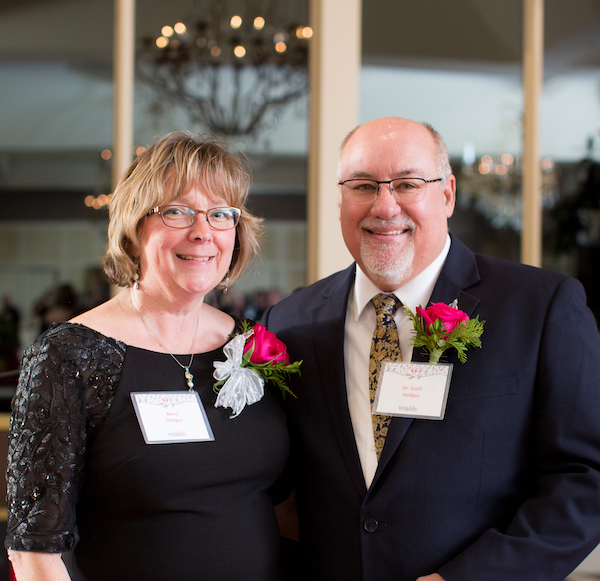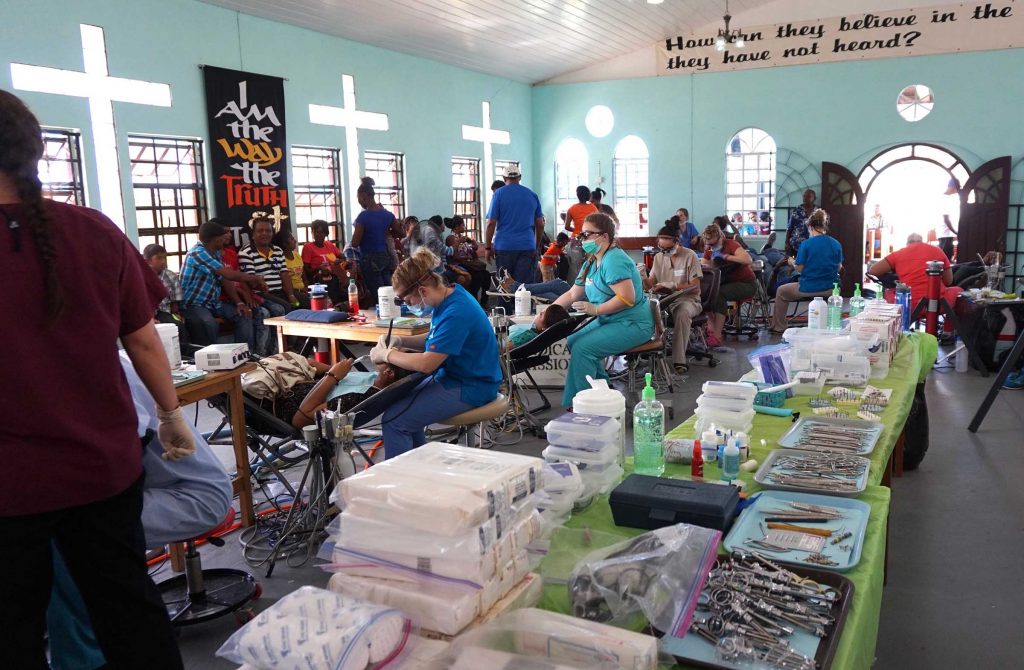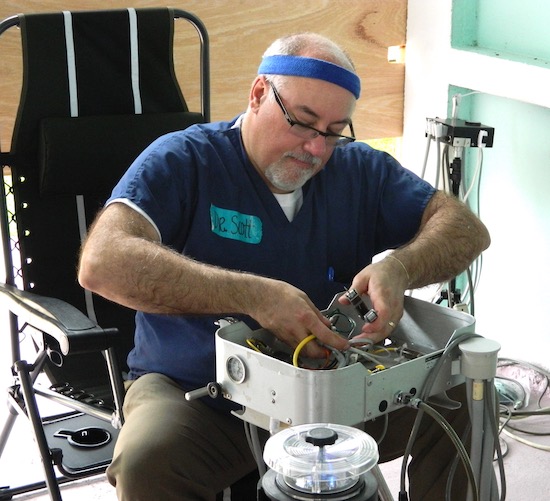Alumni Profile: Dr. Scott Hodges (DDS 1986, MS 1991)11 min read
Providing dental care to the underserved is a big part of this dentist’s mission
This profile is one in a series highlighting School of Dentistry alumni, donors and students.
Ann Arbor, Mich., April 22, 2019 — When Scott Hodges was a high school kid working 70 or 80 hours a week all summer long at his family’s golf course, he concluded that there must be a better way to make a living. He investigated the options, talked with his dentist-uncle and for many years all the way through college told everyone he was going to become a dentist. Then he flunked the Dental Admissions Test. Not even close.

It was the classic inauspicious start that would surprise most people who know the Dr. Scott Hodges who today is one of the busiest dentists you will find. He’s the longtime senior partner in a thriving endodontics practice in Grand Rapids, Mich., and for the last 20 years has taken his dentistry skills around the world several times a year to provide oral healthcare to people who wouldn’t otherwise receive it. The Dominican Republic. Guyana. Costa Rica. Jordan. The West Bank. Lebanon. Rural Alaska.
Lots of dentists, dental students, doctors and medical students take what are commonly called “mission trips” around the world, but the term seems particularly appropriate for Hodges. It fits well with the story of how he overcame his bad test result, revised his initial perception of why he wanted to be a dentist and settled into what is now his broader life mission.
Hodges’ failed first attempt at the Dental Admissions Test, or DAT, came during his junior year at Western Michigan University. By then he had met and married his wife, Mary, who had a strong religious faith that impressed Scott. As he considered how to rebound from the failed DAT, he began to refine his long-stated boast that he wanted to be a dentist to get rich. He also knew he would need to spend the entire summer between his junior and senior years studying for the DAT re-take. It would help him overcome his lifelong reading challenge that had required remedial reading classes in high school.

He also tried an additional strategy for success. “In desperation, I did something I do not recommend to anyone,” he said. “I prayed and finally said, God, if you allow me to get into dental school, I will become a dentist to help people.” His test scores on the re-take were excellent. One portion was even in the highest 1 percent of everyone who took the test. “I would tell you that I believe this was God confirming to me that, when I took the test the second time, I wanted to become a dentist for the right reason.”
He was admitted to the U-M dental school and began what was a non-traditional four years compared to other students. He and Mary already had one child when he entered dental school and two more followed by the time he graduated in 1986. Faced with student debt and the financial needs of a growing family, he accepted a job with the U.S. Public Health Service that included housing, a car and debt deferment for some of his student loans. He took his family to Arizona to work with the Indian Health Service on the Hopi reservation.
It was a great learning experience for a young dentist who was paired with a variety of specialty dentists who regularly cycled through the demanding schedule of appointments. Hodges initially thought he might take training in orthodontics and join the practice of his uncle, Edward Herremans (U-M DDS 1963, MS 1974). That idea was changed by the rapid pace and high demand for patient care on the reservation. Although he worked with an orthodontist there, he spent a significant amount of time doing emergency root canals and other endodontic procedures. “I learned I had much less desire to work with teenagers who were not very compliant for a 2- to 3-year period in braces, versus a person in pain who could be relieved in one or two appointments,” he said. At the end of his public service commitment in Arizona, he returned to U-M, earning his MS degree in endodontics in 1991.

Hodges’ graduate faculty mentor, Dr. John Corcoran, suggested he contact two well-established endodontists in Grand Rapids, Drs. Gerald VanderWall (DDS 1955, MS 1971) and Lawrence Marcotte (DDS 1967, MS 1972). Hodges said Marcotte was about to start a year as president of the Michigan Dental Association and wouldn’t be able to see as many patients. VanderWall had agreed to stay and run the office before retiring, so the veteran dentists took on the young dentist. Hodges said he will be forever grateful for the wisdom and experience they shared with him. He came to respect and emulate their “tried and true principles of how to treat patients” and their community service in dentistry without drawing attention to themselves. All these years later, Hodges is now the senior dentist among five in the practice, which has been serving patients in Grand Rapids for 48 years.
Hodges said the impetus for his foray into international mission trips stems in part from his time working in a summer research program at the dental school with Drs. Paul Lang and Marilyn Woolfolk. Their commitment to community service and public health, along with his later experience on the Hopi reservation in Arizona, meshed with his Christian faith to create a desire to help those who need help. This month he is on his 23rd international mission trip, a journey that has included countless dentist-friends from Michigan and around the country, as well as all six of his children, his wife and two of his sons-in-law, one of whom is a dentist, Steve Obreiter (DDS 2008).
Hodges’ first three trips, starting in 1999, were to the Dominican Republic with his friend Dr. Steve Hall (DDS 1982), who became a regular collaborator on many other trips in succeeding years. Next came Guyana in 2004 when he joined Dr. Donald French (DDS 1964) in a church-based mission trip. He has returned there for 16 consecutive years, providing free treatment, education and equipment for patients, as well as collaborating with the only Guyanan dental school. The teams who go each year can number upwards of 30 people – dentists, hygienists, dental assistants, nurses, dental school students and faculty, including some from U-M, and dental hygiene students and faculty, usually from Ferris State University.
During the latest mission to Guyana, in March 2019, the team treated more than 550 patients. In his annual report to the country’s Minister of Public Health, Hodges included some remarkable historical data about the previous 15 years of the program. The teams have treated 8,253 patients, provided 7,000 cleanings, completed more than 6,000 restorations and performed many other procedures such as extractions, root canals, sealants and radiographs. Using Michigan fee schedules, the work comes to nearly $3.6 million. Add in the $700,000 logged for travel, supplies and donated equipment over the years and the grand total is about $4.3 million.
Participating in a program of that magnitude and duration might seem like enough of a contribution of one person’s time, skill and money, but there’s more. Ten years ago Hodges added Alaska to his outreach efforts, joining another church-based effort led by Don French, among others. The trips are used to treat missionaries who are stationed throughout the vast, remote areas of Alaska. Traveling to cities where there is dental care can be prohibitively expensive for the missionaries, so the volunteer dentists time their visit to an annual retreat that brings the missionaries together. The dental teams see about 125 patients over the course of a week. Several patients with more serious dental issues have been flown to Michigan, staying at Hodges’ home near Grand Rapids so they could receive advanced treatment at his office.
In the last few years, Hodges has added a smaller outreach effort in the Middle East, traveling with one other dentist to Jordan, the West Bank and Lebanon. He says these visits have been more emotionally challenging because some of his patients are Syrian refugees who have lost their spouses, children or parents to war. He was scheduled to return to that region at the end of April.
Hodges is proud of the emphasis he puts on education during the three or four mission trips he takes each year. Dental teams who leave the U.S. for less-developed countries usually find a higher percentage of serious dental problems and a very high demand for their services. That can lead to expediency — treating a lot of patients in a short amount of time — winning out over extended treatment options. The adage is: “You only want to see a tooth once.” Extracting a tooth eliminates the patient’s pain and reduces the chances of a return visit for the same underlying problem, but missing teeth can have a negative impact on oral health and damage the patient’s self-confidence. Hodges says his approach is to educate patients on their options and attempt to treat mission patients as he would treat his Michigan patients, given the limited clinical and equipment options faced in developing countries. The other aspect of education is explaining to patients, or their parents in the case of young children, about good oral hygiene, brushing and flossing, and the benefits of a good diet and limiting sugary drinks. “We want to try to impact the next generation,” he says.
Some of Hodges’ volunteer work comes much closer to home, here in Michigan. He has been dental chair of the Michigan Dental Association’s Mission of Mercy Clinic, a major undertaking every other year that offers free treatment to hundreds of Michigan residents in a single weekend. Like many other dentists around the state, he has participated in smaller clinics that provide free care to the underserved and the elderly.
Whether he is talking about outreach in Michigan or halfway around the world, Hodges frequently injects into the conversation that he is just one of thousands of U.S. healthcare providers who donate their services to the underprivileged around the world. Like the others, he does it for the personal satisfaction, not the public recognition. He is grateful to have been in a professional and financial position to contribute and to meet the many altruistic people on the teams he’s worked with. He uses one of the famous lines of U-M’s legendary football coach Bo Schembechler to thank “all those who have encouraged me and then put their hand in with mine and created ‘The Team, The Team, The Team.’ ” He’s particularly appreciative of his wife’s sacrifices. Mary Hodges stayed home with their children while Scott and sometimes one or two of their kids went on the missions. Only in the last eight years, as their children became adults, has Mary joined Scott in Alaska, and she went on her first international mission last year.
Several professional organizations have noticed the extent of Hodges’ mission work, including the American and Michigan dental associations and the American Association of Endodontics, which have presented him with awards. Of particular significance to Hodges was the Distinguished Service Award, also called the Silent Bell Award, that he received in 2017 from the West Michigan District Dental Society. There to congratulate him that night were Jerry VanderWall and Larry Marcotte, his mentors (and also previous Silent Bell recipients) who had brought him into their practice more than 25 years earlier.
“It was a very special, humbling time for me when I received the Silent Bell in the presence of Jerry and Larry,” Hodges said. “It confirmed the trust they had put in me as a young practitioner, to carry on what they had started.”
###
The University of Michigan School of Dentistry is one of the nation’s leading dental schools engaged in oral health care education, research, patient care and community service. General dental care clinics and specialty clinics providing advanced treatment enable the school to offer dental services and programs to patients throughout Michigan. Classroom and clinic instruction prepare future dentists, dental specialists and dental hygienists for practice in private offices, hospitals, academia and public agencies. Research seeks to discover and apply new knowledge that can help patients worldwide. For more information about the School of Dentistry, visit us on the Web at: www.dent.umich.edu. Contact: Lynn Monson, associate director of communications, at [email protected], or (734) 615-1971.
